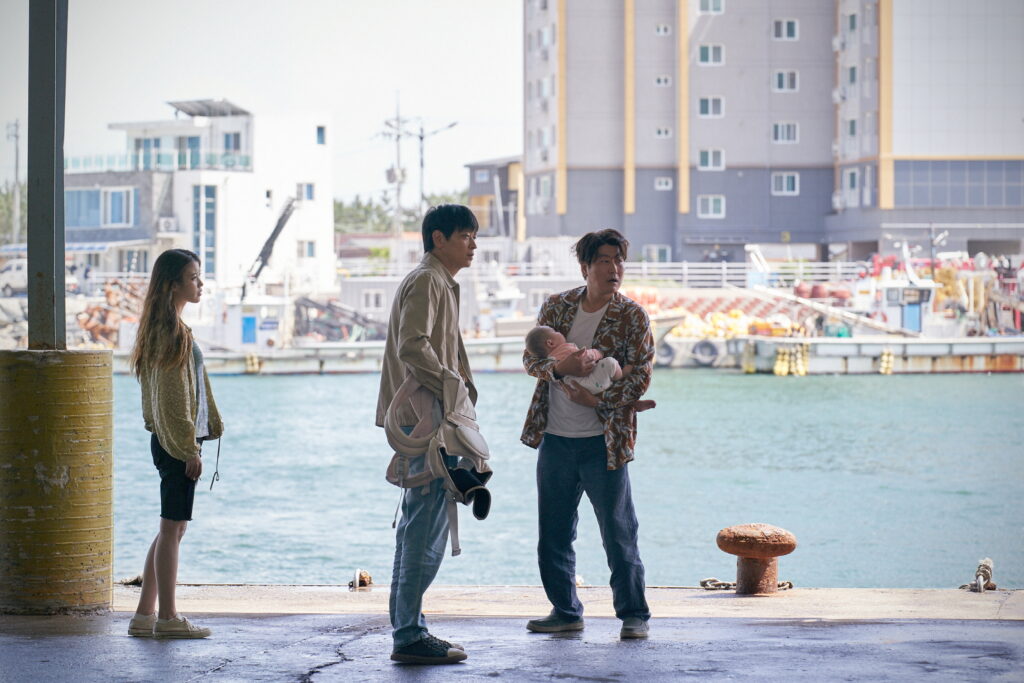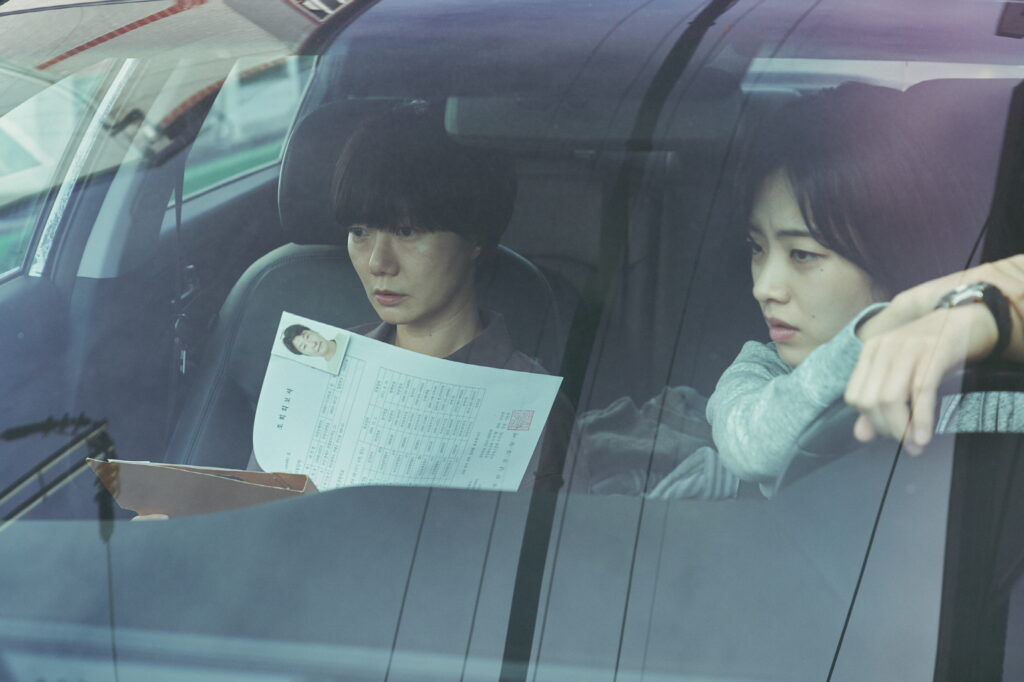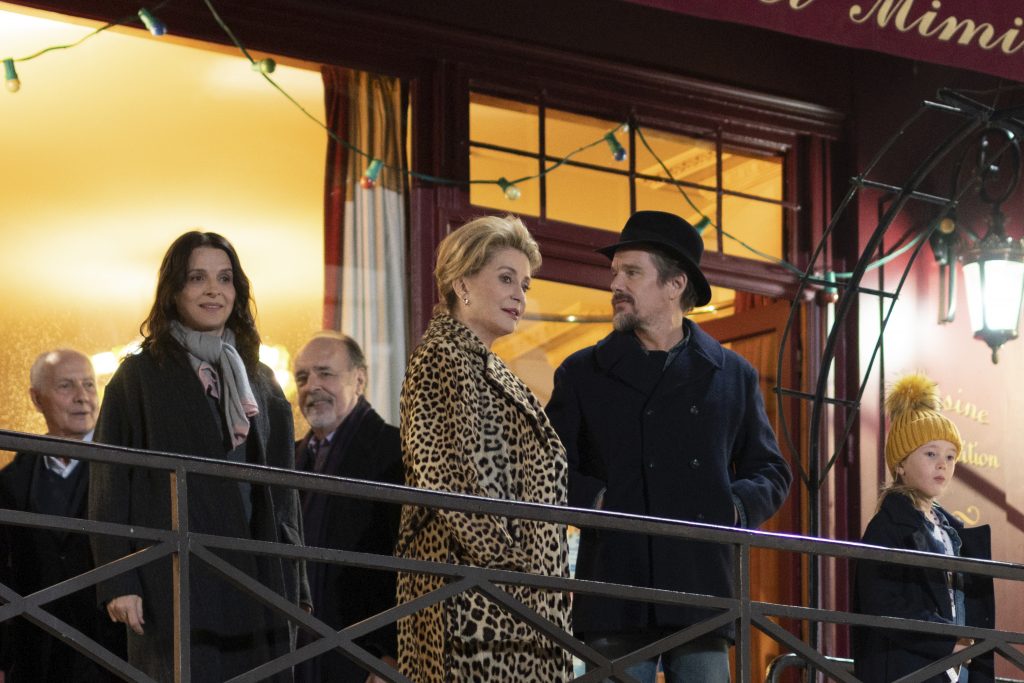December 29, 2022
by Carla Hay

Directed by Hirokazu Kore-eda
Korean with subtitles
Culture Representation: Taking place in South Korea, the dramatic film “Broker” features an all-Asian cast of characters representing the working-class, middle-class and criminal underground.
Culture Clash: Two working-class men, who are in the business of brokering illegal adoptions, go on a tension-filled journey with a young mother who wants decide which family will buy and raise her baby.
Culture Audience: “Broker” will appeal primarily to people who are fans of star Song Kang-ho, filmmaker Hirokazu Kore-eda, and movies people who form an unlikely family bond.

Suspenseful, amusing, and sometimes heartbreaking, “Broker” tells a memorable story about three people who find more than they bargained for when they attempt to sell a baby. The baby’s sassy mother insists on being able to choose who will get the child. “Broker” does not condone selling of children. Instead, it takes an unflinching look at the emotional toll of illegal adoptions.
Written and directed by Hirokazu Kore-eda, “Broker” had its world premiere at the 2022 Cannes Film Festival, where the movie won the Ecumenical Jury Award and the Best Actor Award (for Song Kang-ho). “Broker” also made the rounds at other major film festivals in 2022, including the Toronto International Film Festival and the Telluride Film Festival. It’s a movie that doesn’t preach or offer easy answers but presents a fascinating portrait of what desperate human beings will do.
Hirokazu’s 2018 film “Shoplifters” won the Cannes Film Festival’s top prize—the Palme d’Or—in 2018, and received an Oscar nomination for the category that was then known as Best Foreign Language Film. “Broker” might get some comparisons to “Shoplifters,” because both movies have themes about outlaws who form a family-like bond. However, “Broker” moves at a much quicker pace and has much more satirical and occasionally comedically absurd moments than “Shoplifters.”
“Broker” (which takes place in South Korea) takes viewers on an unusual journey that finds strangers’ lives intertwined with each other in unexpected ways. Ha Sang-hyeon (played by Song) is a mild-mannered owner of a small business that does laundry by hand. His ultra-confident friend Kim Dong-soo (played by Gang Dong-won) works part-time at a church that operates a small orphanage that has about 20 of various ages at any given time. Sang-hyeon is in his 50s, while Dong-soo is about 10 years younger. They are not biologically related to each other but have a relationship that’s a lot like what an older brother and a younger brother would have.
Sang-hyeon and Dong-soo are also bonded by a big secret: They sometimes sell babies who’ve been abandoned at the church. Sang-hyeon is usually the one who does the actual abductions, while Dong-soo helps by deleting the church’s surveillance videos that would show the babies being left at the church and Sang-hyeon doing the kidnapping. Sang-hyeon and Dong-soo believe that what they’re doing isn’t so bad because they are placing the babies in homes where the children are wanted. Most of their clients are married couples who are having infertility problems.
The opening scene of “Broker” shows a baby boy being left at the church by the baby’s single mother. The church has a 24-hour “drop box” where babies can be left, with no questions asked. As the mother leaves, she is being observed by two female undercover police officers are doing a stakeout in their car. These two cops are investigating suspicions that babies abandoned at this church are being sold on the black market.
The police officers on this stakeout are Soo-jin (played by Bae Doona, also known as Doona Bae) and her younger cop partner Detective Lee (played by Lee Joo-young), who often defers to the more-experienced Soo-jin. It’s shown from the opening scene that Soo-jin is much more judgmental than Detective Lee about women who abandoned their children. Soo-jin says when she watches the young mother leave her baby at the church: “If you have a baby, you shouldn’t abandon it.”
The mother who left behind her baby boy at the church has left a note with the child. The note says, “Woo-sung, I’m sorry. I’ll come back for you.” Sang-hyeon comments to Dong-soo that it’s highly unlikely that the mother will come back for the baby, so Sang-hyeon tells Dong-soo to delete the surveillance video that the baby was left at the church. Sang-hyeon then takes the baby to his home.
Sang-hyeon’s assumption that the mother wouldn’t come back ends up being a very wrong assumption. The mother, who’s in her 20s, is named Moon So-young (played by Lee Ji-eun), and she returns to the church to get her baby Woo-sung (played by Park Ji-yong). So-young is concerned and then outraged to find out that the child isn’t there. She won’t leave until Woo-sung is brought back to the church.
Dong-soo tells her, “Even if we find the baby, there’s no proof that you’re the mother.” Sang-hyeon says to her, “Think of us as cupids who will embrace your precious child. We promise to find the best parents to raise Woo-Sung.” So-young replies, “Benevolence, my ass. You’re just brokers.”
So-young has not only figured out that Sang-hyeon and Dong-soo illegally sell babies, she wants in on the deal to broker the adoption of her baby. So-young has one condition though: She wants to be the one to approve who will get the baby and the sale price. So-young knows that boys are more valued in this patriarchal culture than girls, so she believes she should get a higher price for her baby son, compared to if she had a baby daughter.
And so begins a sometimes messy and tension-filled journey, as So-young insists on accompanying Sang-hyeon and Dong-soo when they travel to different cities in South Korea to meet with potential adoptive parents for Woo-Sung. (A great deal of the movie takes place in Busan.) Through a series of circumstances, an 8-year-old boy named Hae-jin (played by Im Seung-soo), from the church orphanage, gets mixed up in these hijinks. Hae-jin has grown emotionally attached to Sang-hyeon and wants to tag along on these road trips.
Meanwhile, some people are hot on the trail of this motley crew of baby brokers. The two undercover cops, who have identified Sang-hyeon and Dong-soo as the chief suspects and want to catch them in the act of selling a baby, in order to arrest Sang-hyeon and Dong-soo. Meanwhile, Dong-soo is a gambling addict who is heavily in debt to a gangster named Shin Tae-ho (played by Ryu Kyung-Soo), who goes with some of his thugs to track down Dong-soo.
A few things about “Broker” require a suspension of disbelief. It’s mentioned more than once in the film that law enforcement believes that Sang-hyeon and Dong-soo are part of a major crime ring that sells babies. If that’s the case, then it doesn’t make sense that there only two cops doing the surveillance. The movie has some intentionally comical moments where Soo-jin and Detective Lee bungle the investigation or just have very bad luck.
Despite a few plot holes, one of the best things about “Broker” is the development of the characters. So-young isn’t as cold and calculating as she first appears to be. Over time, her apparent greed in wanting to sell Woo-Sung to the highest bidder is revealed to be something more than just being money-hungry. And where is Woo-Sung’s father? That question is answered in the movie.
“Broker” shows the highs and lows of this group of outlaws and two children who end up becoming a makeshift family. The movie has the expected scenes of people bickering, but “Broker” also organically shows how even with the arguments, these seemingly mismatched cronies learn to trust each other. There are some adrenaline-packed action scenes, but some of the movie’s best moments happen during revealing conversations when these characters find out more about each other, including emotional vulnerabilities and some dark secrets.
All of the cast members handle their roles very well, but Song (as Sang-hyeon) and Lee Ji-eun (as So-young) are the ones who have the most believable characters and give the best performances in the film. “Broker” offers different perspectives of why people want to buy and sell babies. The movie also gives realistic depictions of the consequences of making these decisions. “Broker” lets views make up their own minds on how to feel about it all. Even though parts of the film are predictable, there’s at least one plot twist that many viewers won’t expect, making “Broker” better than the average movie about illegal adoptions.
Neon released “Broker” in New York City on December 26, 2022, and in Los Angeles on December 28, 2022, with an expansion to more U.S. cinemas on January 6, 2023. The movie was released in South Korea on June 8, 2022.


